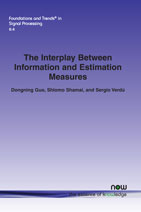The Interplay Between Information and Estimation Measures
By Dongning Guo, Northwestern University, USA, dGuo@northwestern.edu | Shlomo Shamai (Shitz), Technion – Israel Institute of Technology, Israel, sshlomo@ee.technion.ac.il | Sergio Verdú, Princeton University, USA, verdu@princeton.edu
Abstract
This monograph surveys the interactions between information measures and estimation measures as well as their applications. The emphasis is on formulas that express the major information measures, such as entropy, mutual information and relative entropy in terms of the minimum mean square error achievable when estimating random variables contaminated by Gaussian noise. These relationships lead to wide applications ranging from a universal relationship in continuous time nonlinear filtering to optimal power allocation in communication systems, to the simplified proofs of important results in information theory such as the entropy power inequality and converses in multiuser information theory.
The Interplay Between Information and Estimation Measures
If information theory and estimation theory are thought of as two scientific languages, then their key vocabularies are information measures and estimation measures, respectively. The basic information measures are entropy, mutual information and relative entropy. Among the most important estimation measures are mean square error (MSE) and Fisher information. Playing a paramount role in information theory and estimation theory, those measures are akin to mass, force and velocity in classical mechanics, or energy, entropy and temperature in thermodynamics.
The Interplay Between Information and Estimation Measures is intended as handbook of known formulas which directly relate to information measures and estimation measures. It provides intuition and draws connections between these formulas, highlights some important applications, and motivates further explorations. The main focus is on such formulas in the context of the additive Gaussian noise model, with lesser treatment of others such as the Poisson point process channel. Also included are a number of new results which are published here for the first time. Proofs of some basic results are provided, whereas many more technical proofs already available in the literature are omitted. In 2004, the authors of this monograph found a general differential relationship commonly referred to as the I–MMSE formula. In this book a new, complete proof for the I–MMSE formula is developed, which includes some technical details omitted in the original papers relating to this.
The Interplay Between Information and Estimation Measures concludes by highlighting the impact of the information–estimation relationships on a variety of information-theoretic problems of current interest, and provide some further perspective on their applications.
